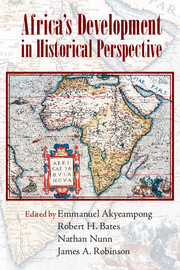Book contents
- Frontmatter
- Contents
- Author Biographies
- Acknowledgments
- Introduction
- Part I La Longue Durée
- Part II Culture, Entrepreneurship, and Development
- Part III Institutions
- Part IV External Forces
- 14 Dahomey in the World: Dahomean Rulers and European Demands, 1726–1894
- 15 The Transatlantic Slave Trade and the Evolution of Political Authority in West Africa
- 16 Gender and Missionary Influence in Colonial Africa
- Index
- References
16 - Gender and Missionary Influence in Colonial Africa
Published online by Cambridge University Press: 05 September 2014
- Frontmatter
- Contents
- Author Biographies
- Acknowledgments
- Introduction
- Part I La Longue Durée
- Part II Culture, Entrepreneurship, and Development
- Part III Institutions
- Part IV External Forces
- 14 Dahomey in the World: Dahomean Rulers and European Demands, 1726–1894
- 15 The Transatlantic Slave Trade and the Evolution of Political Authority in West Africa
- 16 Gender and Missionary Influence in Colonial Africa
- Index
- References
Summary
Introduction
Increasingly, evidence has emerged showing that the historical presence of European missionaries is an important factor affecting economic development across the globe today. The causal mechanism that has received the most attention, and the most empirical support, is education. The presence of Christian missionaries, particularly Protestant missionaries, has been shown to be strongly correlated with increased educational attainment, and the effects appear to persist for many generations (Bai and Kung 2011; Grier 1997; Woodberry 2004, 2009). The education-promoting influence of Protestant missionaries is not surprising given the evidence that the rise of Protestantism within Europe had long-term education (and economic growth) promoting effects (Becker and Woessmann 2009, 2008, 2010; Schaltegger and Torgler 2009).
This study provides evidence for the long-term impact of colonial missionary activity within Africa. The analysis uses data on the location of Protestant and Catholic missions from a map titled “Ethnographic Survey of Africa: Showing the Tribes and Languages; also the Stations of Missionary Societies” published by William Roome (1924). This information, combined with data on the locations of ethnic groups from Murdock (1959), is used to calculate estimates of the exposure of African ethnic groups to missionary activity.
- Type
- Chapter
- Information
- Africa's Development in Historical Perspective , pp. 489 - 512Publisher: Cambridge University PressPrint publication year: 2014
References
- 55
- Cited by



